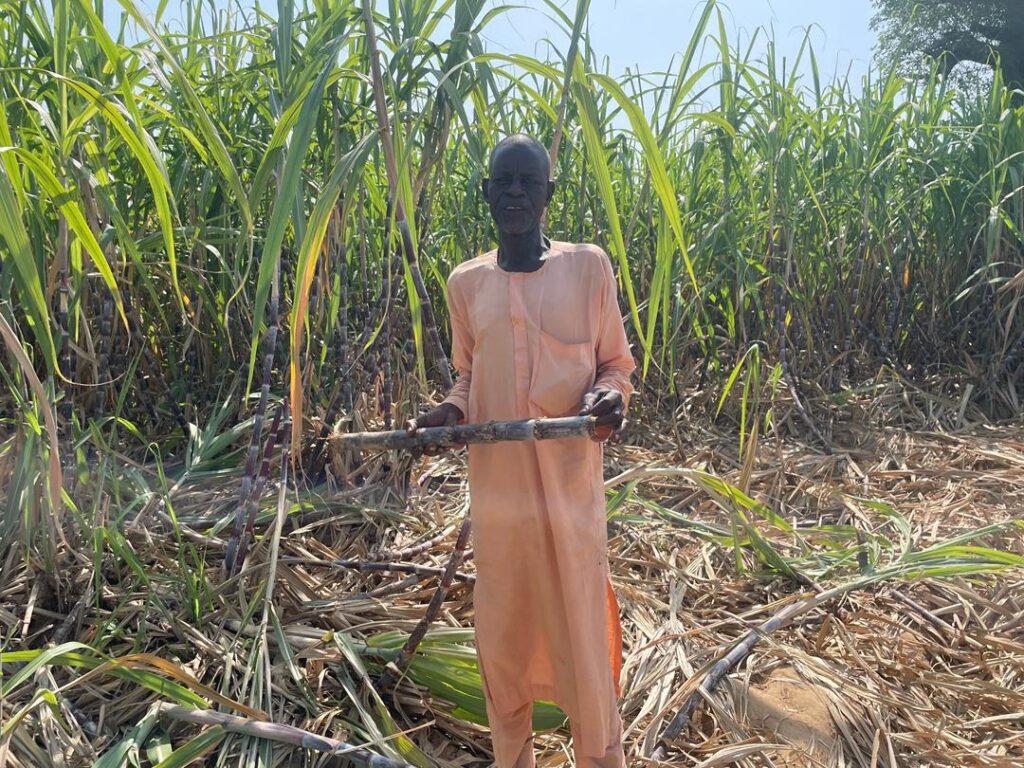By Victor Christopher (@victorpherbrown)
When the sun rose over the quiet fields of Gamadan in Kura Local Government Area of Kano State, Ahmadu Bala stood motionless in the middle of what used to be his booming sugarcane farm. Where lush green stalks once stood tall, only smoke and ashes now filled the air.
For years, Ahmadu was widely known for his thriving sugarcane business, earning over ₦10 million every harvest. But today, he is battling heartbreak — and looming debt — after a strange worm outbreak ravaged his entire farm.
“I spent ₦500,000 on insecticide, yet everything was destroyed,” he said, his voice breaking. “I may not make even ₦500,000 this year.”
With a ₦3 million loan hanging over his head and no crop left to harvest, Ahmadu fears he may lose everything.
Farms Burnt to Stop the Spread
A few metres away, Mallam Abdulhamidu Gamadan made a painful decision — he set his own farm on fire.
The worms had ruined his ₦10 million worth of sugarcane so badly that he felt burning it was the only option.
“If I take it to market, buyers will reject it. The sweetness is gone,” he lamented.
He borrowed ₦1.5 million to finance the farm. Now, he doubts he will make even ₦1 million in return.
“This worm eats the sugarcane from the inside. We have never seen anything like this.”
READ ALSO: Kano Community Where No Girl Has Finished Secondary School In 300 Years
Farmers Losing Everything — Sugarcane and Maize Alike
For Auwalu Isa Gamadan, the devastation hit twice.
He lost both his ₦3.2 million sugarcane farm and his maize farm that normally produced 60 bags yearly.
“Now I don’t know how to feed my wife and children,” he said. “This farm is our only livelihood.”
Another smallholder farmer, Garba Dan-Ali, suffered the same fate.
His ₦3.2 million worth of sugarcane was completely wiped out.
“When you walk through our farms now, you can hardly find a single stalk that is not affected,” he said. “The worms are everywhere.”
A Once-Booming Sugarcane Hub Now in Ruins
Gamadan was once one of Kano’s busiest sugarcane markets, supplying at least 30 trucks per week to the state and beyond.
Today, the entire community looks abandoned — no buyers, no harvest, no sweetness left in the surviving stalks. During a visit to the area, it was difficult to find even one healthy sugarcane stick.
Hundreds of families — farmers, transporters, traders — who relied on the business have now slipped into uncertainty.
READ ALSO: Deadly Jealousy: How Girlfriend Attacks Boyfriend’s Co-Worker With Hot Water In Kano
Over 500 Farmers Hit Across Five Communities
According to Mallam Usman Abdu, Chairman of the Gamadan Farmers Association, the outbreak is the worst in recent history.
“Over 500 farmers across five communities have been affected,” he said.
“Many took loans from banks. We are begging for patience — nobody expected this kind of disaster.”
Despite repeated attempts to fight the worms with insecticides, nothing worked.
Now, many farmers fear losing their land, cattle, and equipment if they fail to repay their debts.
‘We Can No Longer Feed Our Families’ — Village Head Cries Out
Village Head of Gamadan, Ali Abdu, said the outbreak has thrown the community into deep distress.
“Farmers cannot even feed their families,” he said. “Sugarcane was our main source of income, and now it is gone.”
He appealed to government agencies, NGOs, and kind-hearted Nigerians to come to their rescue.
“If help doesn’t come, families will go hungry. We need seeds, fertiliser, and financial support to start again.”
READ ALSO: INVESTIGATION: Pregnant Women ‘Die Monthly’ In Kano Community Despite Modern Healthcare Facility
Agric Experts Raise Alarm
Agricultural experts say the disaster could have been reduced with early prevention.
Aminu Ibrahim, Director of Agricultural Extension at KNARDA, warned farmers to adopt better farm management practices.
“They must sanitise their farms to kill remaining worms or eggs,” he said.
“Farmers should also practice crop rotation. Planting sugarcane on the same land yearly encourages infestations.”
He confirmed that KNARDA is preparing a report to the Kano State Government seeking emergency assistance for affected farmers.
A Community in Ruins — Yet Hoping for Recovery
With millions of naira gone, and an entire farming community on the brink of collapse, the caterpillar worm outbreak in Kura has become one of Kano’s most devastating agricultural disasters in years.
Still, farmers in Gamadan cling to the hope that with support and prayer, their scorched, broken land will one day flourish green again.
